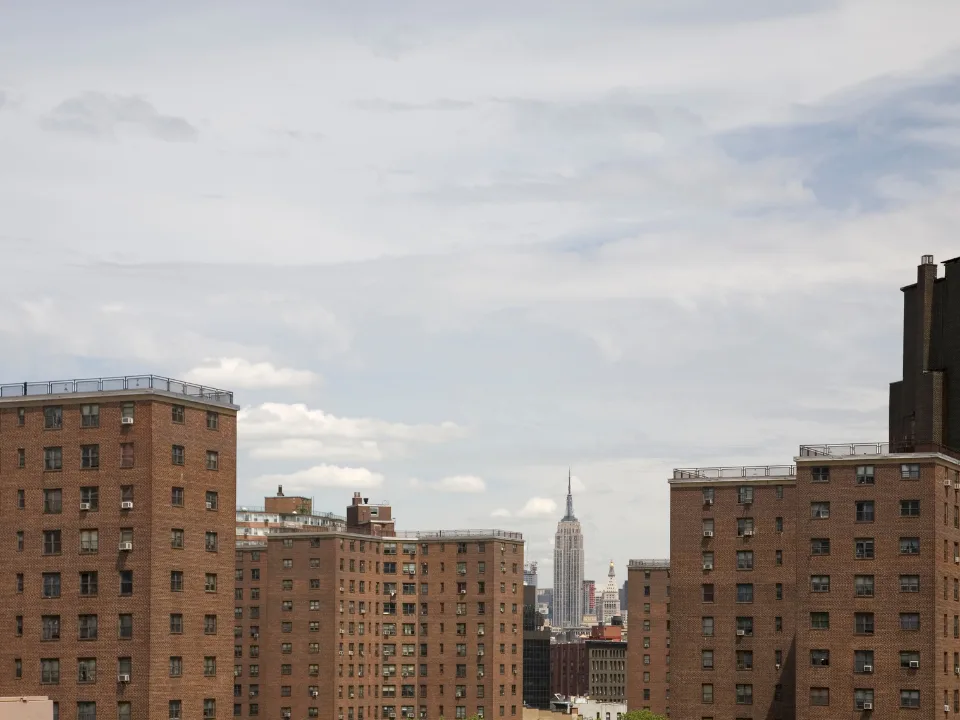NYC Apartment Vacancy Hits 50-Year Low at 1.4%
The latest data from the triennial New York City Housing and Vacancy Survey paints a concerning picture.
Good morning. New York City’s rental market is under pressure, with the lowest vacancy rates in over five decades. Meanwhile, owners of the elite members club Soho House are considering taking it private after a short seller report.
Today’s issue is brought to you by AirGarage, a cutting-edge technology provider focused on maximizing revenue for your parking assets.
|
👋 First time reading? Sign up. |
🎁 Want free merch? Share this. |
Market Snapshot
|
|
||||
|
|
*Data as of 2/10/2024 market close.
MARKET SLUMP
NYC’s Rental Housing Crunch Hits 50-Year Low

New York City’s rental market is under immense pressure, with the lowest vacancy rates in over five decades.
Survey says: New York City is witnessing an extraordinary decline in available rental properties, with the vacancy rate dropping to a mere 1.4%. This figure represents the lowest vacancy rate since 1968 and is significantly below the 5% to 8% range that characterizes a healthy housing market.

Source: NYC.gov
Falling short: The latest data from the triennial New York City Housing and Vacancy Survey paints a concerning picture. Despite adding 60,000 homes to the housing stock, the city’s population growth outpaced this expansion, increasing 275,000 households. Consequently, only 33,000 rental units were available across New York City.
“The data is clear: The demand to live in our city is far outpacing our ability to build housing,” Mayor Eric Adams said in a statement Thursday as he announced the numbers, per the NYT. “New Yorkers need our help, and they need it now.”
The struggle is real: The housing shortage is particularly severe for lower-income residents: Vacancies for apartments under $1,100 are below 0.4%, and barely 1% for those up to $1,649. High-rent units’ availability has also plummeted. Over 86% of households earning under $25K spend more than half their income on rent, highlighting the acute affordability crisis.

➥ THE TAKEAWAY
The clock is ticking: With the housing crisis at a critical point, there are calls for immediate policy action. Housing advocates like Rachel Fee are urging the creation of incentives to stimulate housing production. The focus is on measures like the 421-a tax abatement, which Governor Kathy Hochul is looking to reintroduce in the upcoming legislative session to alleviate the housing shortage.
SPONSORED BY AIRGARAGE
Are Legacy Parking Operations Hurting Your Bottomline?
Increase your property’s net operating income with AirGarage’s full-service parking management.
Legacy parking companies rely on manual labor and expensive third-party hardware & software products to manage their facilities. This increases their operating expenses and hurts property owners’ bottom line.
AirGarage is a vertically integrated parking management and technology solution that maximizes your income by increasing traffic, optimizing revenue per vehicle, and decreasing operating expenses.
The average property owner who switches to AirGarage from a legacy parking operator sees a 23% NOI increase in the first year.
Talk to AirGarage today and let them show you how they can increase your NOI with a custom proposal for your parking facility.
✍️ Editor’s Picks
-
Housing hero: Six months after NYC’s Local Law 18 targeting short-term rentals, its effect on boosting the hospitality industry is clear, but its aim to alleviate the housing crisis flops.
-
Leadership shift: BlackRock elevated Paul Tebbit and Thomas Mueller-Borja as its first-ever co-heads of real estate, overseeing a $28B portfolio within the firm’s massive $10T asset pool.
-
Stadium funding: Pawtucket finalizes $54.3 million in bonds, part of a larger public assistance package for the new professional soccer stadium on the Seekonk River, complementing $10 million in city pandemic aid and state tax credits.
-
Airbnb misuse: Hands-Free Automation exploited Airbnb’s marketplace to relist hotel rooms at higher prices, funding their operations through investor promises of profit from this pricing arbitrage, despite Airbnb’s policy against such practices.
-
Insurance halt: Major tri-state title insurers Madison and Riverside face a business pause by some sellers and servicers following a DOJ investigation involving investor Boruch Drillman.
🏘️ MULTIFAMILY
-
Climate risk: A new study reveals that 41% of U.S. rental units, totaling 18.2 million homes, are at risk due to climate change and extreme weather events.
-
Revamping Hilton: A LA developer is transforming a former Houston Hilton into a multifamily complex, with a $40 million, 13-story project set to start in April.
-
Rent declines: Apartment rent growth is expected to remain stagnant near zero this year, just as it has since August 2023, according to RealPage.
🏭 Industrial
-
Expansion: EastGroup Properties is planning a new 600,000-square-foot industrial facility in Leander, near Austin, with construction starting this year and the first phase ready in 2025.
-
Stable demand: Susan Bergdoll of CRG highlights a return to pre-pandemic norms in industrial development for 2024, driven by ongoing consumer and e-commerce demand.
🏬 RETAIL
-
Recovery: LA County’s retail market shows signs of recovery at the end of 2023, with declining vacant space and increased occupancy, yet still faces challenges with high unused property and leasing down 9% annually compared to 2022.
-
Refinance: Epic Real Estate secured $100 million for refinancing five grocery-anchored shopping centers, facilitated by Prime Finance, John Hancock, and Cushman & Wakefield.
-
Lease growth: Macerich, a major retail landlord, defied market trends by signing leases for 4.2 MSF in 2023, marking a 12% increase from 2022 and its most successful year in three decades.
-
Resilience: Danny Rice of Colliers Houston says that shopping centers are currently the strongest sector in Houston’s CRE, a trend expected to persist, bolstered by the city’s significant population growth and active suburban home construction.
🏢 OFFICE
-
Redesign trends: WeWork’s Global Office Trends report reveals a shift from traditional executive offices to open floorplans and lounge areas based on thousands of design requests.
-
Market cycle: CBRE says that the office market is in its third year of a seven-year cycle, adapting to ongoing changes in remote and hybrid work models.
-
Office woes: The Boulos Co.’s 2024 market outlook identifies the uncertain future of Maine’s office market, questioning if employers can incentivize a return to offices or face downsizing and lease terminations.
THE BIG SHORT
Soho House Considers Going Private Amid Short Seller Turmoil

Soho House (SHCO), the elite members club, is under scrutiny as GlassHouse Research draws parallels between its trajectory and the infamous WeWork saga.
What happened: SHCO, the parent company of high-end hotels and exclusive clubs like Soho House, the Ned, and Scorpios Beach Club, has seen a significant decrease in its market value. The release of GlassHouse’s short report, which cast doubt on Soho House’s financial stability and set a striking $0 price target, led to its stock nosediving by 30% at its worst during the day, eventually closing down 19% at $5. This marked the steepest drop in the stock’s history.

Dire prediction: GlassHouse analysts, who disclosed holding short positions in Soho House, expressed concerns over similarities between Soho House’s trajectory and WeWork’s infamous struggles. They cited growing debt and profitability issues as red flags for the London-based company’s future.
A bumpy road for investors: Since its July 2021 IPO at $14, Soho House’s shares have consistently underperformed, trading over 60% below the initial offering price. Despite this, the stock experienced a notable rebound from a December 2022 low, gaining over 90%, and analysts remain predominantly positive, with an average price target suggesting a significant upside.
➥ THE TAKEAWAY
Why it matters: GlassHouse, known for its forensic accounting, has scrutinized Soho House for around six months. Their report chastised the company for its expansion into less affluent cities, a history of unprofitability, and what they describe as questionable accounting tactics. In response, Soho House rejected the report and announced a $50M share buyback program on Friday.
📈 CHART OF THE DAY
Barry Sternlicht warns of a $1.2 trillion loss in office real estate, with small banks possibly facing major impacts. New York Community Bancorp has already cut dividends due to potential loan issues. Further, property values may drop by 10% more, says Green Street. This scenario challenges landlords and banks, as slower Federal Reserve rate cuts could increase risks for smaller banks deeply involved in commercial real estate. Six charts illustrate the evolving situation.
What did you think of today’s newsletter? |



















